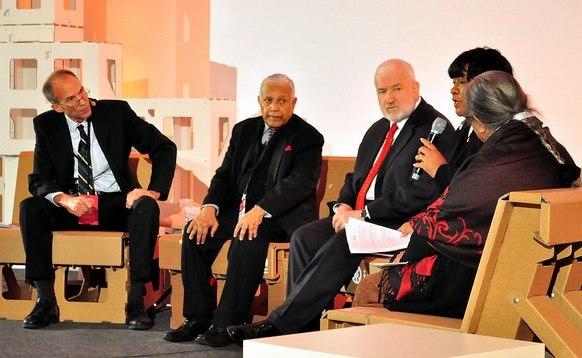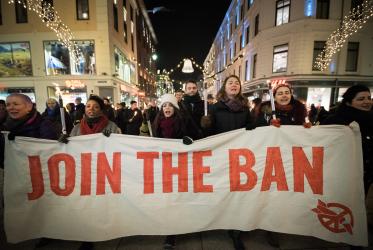After a concerted examination of the evidence presented at the Vienna Conference on the Humanitarian Impact of Nuclear Weapons and two earlier conferences, 44 of the states present called for a ban on nuclear weapons.
The host government Austria added momentum with a specific, cooperative pledge to “fill the legal gap for the prohibition of nuclear weapons” and eliminate them.
The conference, held in Vienna, 8-9 December 2014, capped two years of intense international scrutiny into the human impact of nuclear weapons, including active participation of the World Council of Churches (WCC).
“Thanks to the final decision by the host government, those calling for conclusive action – a growing majority of governments plus other organizations, including religions – a new path forward has opened,” said WCC programme executive Jonathan Frerichs. Host government Austria ended the meeting with a pledge to “fill the legal gap for the prohibition of nuclear weapons” and to “cooperate with all stakeholders” in eliminating them.
In an opening message sent from Rome, Pope Francis called for nuclear weapons to be banned “once and for all,” adopting “the ethic of responsibility” to replace “the ethic of fear.” An interfaith panel co-organized by the World Council of Churches called for states to negotiate “a new legal instrument to prohibit nuclear weapons without further delay and in a forum open to all states and block-able by none,” in a statement delivered at the conference.
158 governments, the United Nations and more than 100 international, civil society, academic and religious organizations heard two days of testimony about nuclear weapons from experts on health, humanitarian and environmental law, climate change, agriculture and the global economy. A philosopher, a risk analyst and a former missile launch officer were among those who addressed the gathering.
Impact on women
The peculiarly destructive effects of nuclear radiation on women and girls stood out, among the many humanitarian concerns. Using data gathered in the Marshall Islands after United States nuclear tests in the 1950s, Mary Olson, a researcher with the Nuclear Information and Resource Service, showed that in children under five exposed to radiation, twice as many girls die than boys. Among adults, three women die for every two men. The data took on special meaning when Olson explained that US authorities had discouraged medical treatment for the affected islanders so that the long-term impact of radiation could be studied more accurately.
Women who are lifelong victims of nuclear radiation, from the Marshall Islands, Australia, the United States and Japan, offered compelling personal testimonies.
“The Austrian Pledge to pursue collective legal action is fortified by the widening scope of public evidence into what nuclear weapons do to people and to the earth,” said Frerichs, one of the ecumenical delegates in Vienna. “The pledge shows leadership from among the many small and medium-sized countries who are establishing the majority’s responsibility for the fate of nuclear weapons, with active support from civil society,” he said.
The scrutiny in Vienna built upon the findings of two similar inter-disciplinary conferences hosted by Norway in 2013 and Mexico in 2014. Austria said in the pledge that it had reached “inescapable conclusions,” including the fact that nuclear weapons’ consequences are “significantly graver” than was understood in the past, raise “profound moral and ethical questions that go beyond debates about [their] legality” and now require collective efforts to “stigmatize, prohibit and eliminate nuclear weapons.”
Just as important as the speakers were the listeners in Vienna, especially diplomats and civil society representatives from the many countries that would be gravely affected by nuclear weapons use but whose voices are not heard in disarmament decision-making bodies as they were in Vienna.
Civil society forum
A Civil Society Forum organized by the International Campaign to Abolish Nuclear Weapons (ICAN) to lead into the conference brought together 650 people from some 200 organizations around the world.
“Nuclear weapons are utterly incompatible with the values upheld by our respective faith traditions—the right of people to live in security and dignity; the commands of conscience and justice; the duty to protect the vulnerable and to exercise the stewardship that will safeguard the planet for future generations,” said Christian, Muslim, Hindu and Buddhist representatives in an interfaith statement to governments from the Civil Society Forum.
“The elimination of nuclear weapons is not just a moral imperative; it is, in effect, the ultimate measure of our worth as a species, as human beings,” General Lee Butler (retired), former commander of US Strategic Nuclear Forces, told the forum via video during the interfaith panel.
Judge Christopher Weeramantry, former vice president of the International Court of Justice, explained teachings of world religions that thoroughly condemn nuclear weapons and called for greater understanding of shared religious ethics which shape international law itself. WCC co-organized the interfaith panel with ICAN, Religions for Peace, and Soka Gakkai International.
Among the nine nuclear-armed states, the United States attended this humanitarian conference for the first time in Vienna, as did the United Kingdom. Only India and Pakistan have attended all three of the meetings. However, the main message of the nuclear-armed states – that the human impact of nuclear weapons is nothing new and has always been factored into their nuclear strategies – appeared to satisfy no one at the conference apart from some of the US’s NATO allies. “It seems that where their impact on people is the clear public focus, nuclear weapons indict themselves,” said Frerichs.
To wide applause, the foreign minister of the Marshall Islands explained a lawsuit by his government asking all nine nuclear powers to fulfil their nuclear disarmament obligations as recompense for the damage done to his country.
The 70th anniversary of Hiroshima and Nagasaki in 2015 was often cited in Vienna. Speakers said that it must serve as a historic deadline for achieving the progress which the three conferences, and a parallel series of majority statements at the UN, have now embedded in the international agenda.








